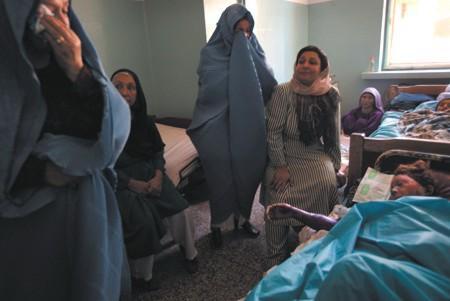By Amelia Thomson-DeVeaux
An article from Time poignantly describes the conditions inside the women's ward of the Istiqlal Hospital burn unit in Kabul, where young women who have attempted to commit suicide by self-immolation lie unconscious or in serious pain. According to the Ministry of Women's Affairs, 103 women who set themselves on fire between March 2009 and March 2010, although these numbers are far from sure, given the difficulty of collecting this kind of data and the fact that many of the women who kill themselves in this manner never make it to the hospital. Almost none of the women survive their suicide attempts.

The legal structure in Afghanistan is still highly patriarchal, another reason that women feel that they must escape abusive relationships through suicide; turning to relatives, clergy, or tribal elders rarely results in a decision that punishes an abuser.
More Photos
These women are struggling to escape the desperate realities of life for women in Afghanistan, where domestic violence is common and women are taught to blame themselves for the abuse that they suffer at their husbands' hands. "Afghan society puts the blame on the woman — that she is not a good woman," explained Selay Ghaffar, director of the Kabul-based NGO Humanitarian Assistance for the Women and Children of Afghanistan, "that she is suffering at home because she is not behaving like a good mother or a good wife. And that's why the husband has the right to beat her."
The legal structure in Afghanistan is still highly patriarchal, another reason that women feel that they must escape abusive relationships through suicide; turning to relatives, clergy, or tribal elders rarely results in a decision that punishes an abuser. Arranged marriages are still "like a form of sale," according to Sayeda Mojgan Mostafezi, Deputy Minister of Women's Affairs, where women are traded to strengthen bonds between families or settle disputes. There are no government-run safe houses for women who are victims of domestic violence, and women have very little awareness that there are escape methods other than suicide. Self-immolation is, for them, the only way out.
It's of course difficult to know how to solve a problem like this, and Ghaffar is right when she notes that women don't just need laws to protect them (although stronger - or any - laws against domestic violence are certainly needed), but a sense that they have allies and access to counseling, safe houses, and divorce. And although women's position in Afghan society has certainly improved since the fall of the Taliban, the impact of more women in the government has yet to turn into a tangible sense of empowerment for most Afghan women, as these tragic cases show.



